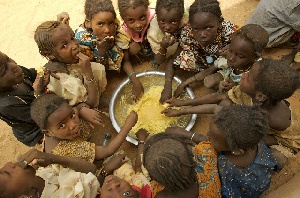- Home - News
- Elections 2024
- News Archive
- Crime & Punishment
- Politics
- Regional
- Editorial
- Health
- Ghanaians Abroad
- Tabloid
- Africa
- Religion
- Photo Archives
- Press Release
General News of Thursday, 8 May 2025
Source: www.ghanawebbers.com
WFP raises alarm over worsening hunger crisis in West and Central Africa
The United Nations World Food Programme (WFP) has issued a warning. A hunger crisis is deepening in West and Central Africa. Conflict, economic hardship, displacement, and extreme weather are major factors. These issues are pushing millions towards severe food insecurity.
According to the latest analysis, over 36 million people struggle to meet basic food needs. This number could rise to more than 52 million during the peak lean season from June to August 2025. Nearly three million people may face emergency conditions (IPC Phase 4). Additionally, about 2,600 people in Mali could experience catastrophic hunger (IPC Phase 5).
Margot van der Velden, WFP’s Regional Director for West and Central Africa, expressed concern. She said the region is at a tipping point with millions of lives at stake. Without urgent funding, WFP may have to reduce its reach and food rations.
Ongoing armed conflicts have displaced over 10 million people. Among them are 2.4 million refugees and asylum seekers in Chad, Cameroon, Mauritania, and Niger. Another eight million are internally displaced within Nigeria, Burkina Faso, and Cameroon.
Rising inflation is worsening the crisis. For example, Ghana's food-insecure population has doubled in one year—from 1.1 million in 2024 to 2.3 million by May 2025. Other countries like Guinea, Côte d'Ivoire, Nigeria, Chad, Niger, and Cameroon also report sharp increases in hunger.
Extreme weather events continue to devastate communities as well. In 2024 alone, floods affected over six million people across the region—especially in the Central Sahel and Lake Chad Basin.
So far in 2025, WFP has reached three million vulnerable individuals with life-saving assistance. This includes refugees and malnourished children. However, without immediate support, up to five million people could lose access to critical aid.
Funding constraints have already impacted operations significantly. Between June and August 2024, WFP assisted only 7.3 million people—60 percent of its target—with many receiving reduced rations. The funding shortfall also threatens UNHAS operations that provide essential air transport for humanitarian efforts.
To sustain operations through October 2025, WFP urgently needs US$710 million. Beyond emergency aid, WFP advocates for long-term investments against hunger's root causes.
Through its Resilience Programme launched in 2018, WFP has rehabilitated over 300,000 hectares of degraded land. This effort supports more than four million people across approximately 3,400 villages in the Sahel.
Van der Velden emphasized the importance of investing in early action and restoring ecosystems. She stated that this approach can protect communities and strengthen local economies.
WFP remains committed to working closely with national governments and humanitarian partners for timely assistance to those in need.











